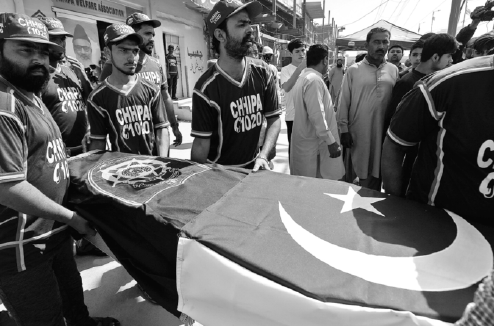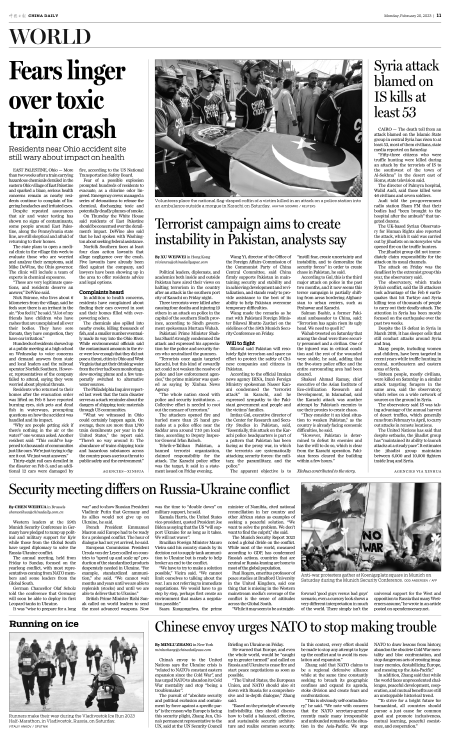
Volunteers place the national flag-draped coffin of a victim killed in an attack on a police station into an ambulance outside a morgue in Karachi on Saturday.
Political leaders, diplomats, and academics both inside and outside Pakistan have aired their views on halting terrorism in the country after an attack in the southern port city of Karachi on Friday night.
Three terrorists were killed after causing four deaths and injuring 19 others in an attack on police in the capital of the southern Sindh province, according to Sindh government spokesman Murtaza Wahab.
Pakistani Prime Minister Shahbaz Sharif strongly condemned the attack and expressed his appreciation for the police and security forces who neutralized the gunmen.
"Terrorists once again targeted Karachi, but this kind of cowardly act could not weaken the resolve of police and law enforcement agencies," the prime minister was quoted as saying by Xinhua News Agency.
"The whole nation stood with police and security institutions. ...Collective effort is needed to root out the menace of terrorism."
The attackers opened fire and hurled more than 25 hand grenades at a police office near the Saddar area around 7:10 pm local time, according to Deputy Inspector General Irfan Baloch.
Tehrik-e-Taliban Pakistan, a banned terrorist organization, claimed responsibility for the attack. The Karachi police office was the target, it said in a statement issued on Friday evening.
Wang Yi, director of the Office of the Foreign Affairs Commission of the Communist Party of China Central Committee, said China firmly supports Pakistan in maintaining security and stability and in achieving development and revitalization, and stands ready to provide assistance to the best of its ability to help Pakistan overcome temporary difficulties.
Wang made the remarks as he met with Pakistani Foreign Minister Bilawal Bhutto Zardari on the sidelines of the 59th Munich Security Conference on Friday.
Will to fight
Bilawal said Pakistan will resolutely fight terrorism and spare no effort to protect the safety of Chinese companies and citizens in Pakistan.
According to the official Iranian news agency IRNA, Iran's Foreign Ministry spokesman Nasser Kanani condemned the "terrorist attack" in Karachi, and he expressed sympathy to the Pakistani government and people and the victims' families.
Imtiaz Gul, executive director of the Center for Research and Security Studies in Pakistan, said, "Essentially, this attack on the Karachi police headquarters is part of a pattern that Pakistan has been facing as the proxy war, in which the terrorists are systematically attacking security forces: the military, the paramilitary, and the police."
The apparent objective is to "instill fear, create uncertainty and instability, and to demoralize the security forces" in order to create chaos in Pakistan, he said.
According to Gul, this is the third major attack on police in the past two months, and it now seems this terror campaign is partially shifting from areas bordering Afghanistan to urban centers, such as Peshawar and Karachi.
Salman Bashir, a former Pakistani ambassador to China, said: "Terrorism has again risen its ugly head. We need to quell it."
Wahab tweeted on Saturday that among the dead were three security personnel and a civilian. One of the injured was in critical condition and the rest of the wounded were stable, he said, adding that the five-story police office and the entire surrounding area had been cleared.
Shakeel Ahmad Ramay, chief executive of the Asian Institute of Eco-civilization Research and Development, in Islamabad, said the Karachi attack was another attempt by Pakistan's enemies to use their proxies to create chaos.
"They consider it an ideal situation to weaken Pakistan," as the country is already facing economic difficulties, he said.
"However, Pakistan is determined to defeat its enemies and has the will to do so, which is clear from the Karachi operation. Pakistan forces cleared the building within a few hours."
Xinhua contributed to the story.
vivienxu@chinadailyapac.com

